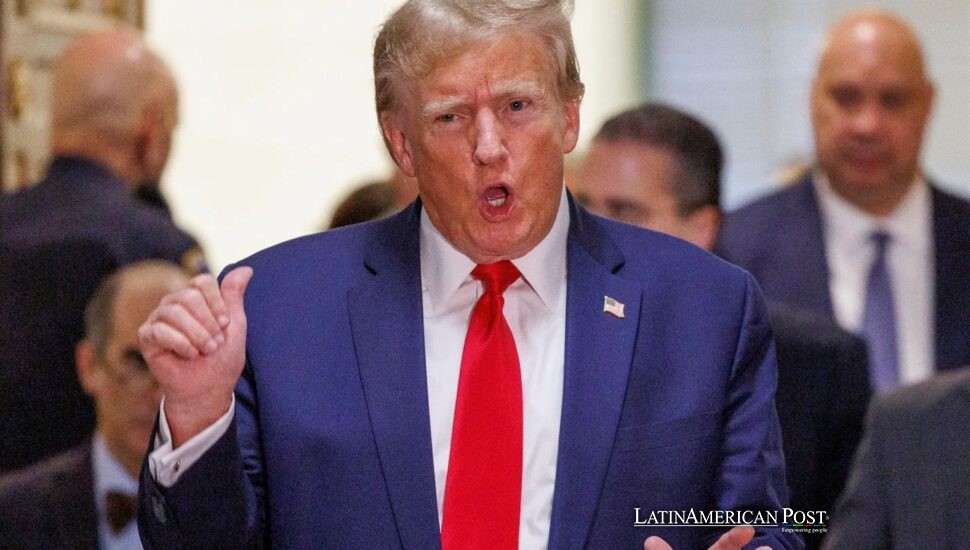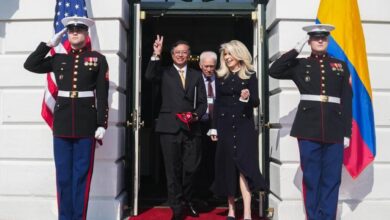Trump's Controversial Mexico's Cartel 'Terrorism' Decree Sparks Political Turmoil

The recent decree to label Mexican cartels as terrorist groups has shaken up Mexico’s political landscape plus sparked heated arguments about national independence and safety. President Claudia Sheinbaum, next to opposition leaders, disagrees about accepting U.S. military assistance or protecting Mexico’s right to self-rule.
A Presidential Edict That Reverberates Across Borders
In late November, then-U.S. President Donald Trump dropped a political thunderbolt into Mexican affairs by announcing his intention to classify certain Mexican cartels as terrorist organizations. He set a two-week timetable to determine which groups would officially earn this label, which sent shockwaves throughout Mexico’s corridors of power. For years, high-level discussions have hovered around the question of whether organized crime syndicates in Mexico qualify as terrorists under U.S. law. Still, the notion had never before coalesced into a formal directive. This time, Trump’s statement—and its near-immediate timeline—thrust the debate from abstract speculation into unsettling reality.
In Mexico City, the ruling administration was caught in the crosshairs.
President Claudia Sheinbaum, successor to Andrés Manuel López Obrador (AMLO), found her policies under intense scrutiny. AMLO’s stance on combatting drug cartels, often summarized as “abrazos, no balazos” (“hugs, not bullets”), had become a subject of withering critique from north of the border. Trump’s decree looked very much like an indictment of that approach. According to Clemente Romero Olmedo, a national security expert at Cronem Consultores, Washington’s move reflected frustration with a Mexican strategy that, in his words, effectively ceded significant territory and economic activity to criminal organizations.
Romero Olmedo’s comments underscore a more significant shift: the Sheinbaum government, inheriting AMLO’s legacy, is forced to step outside “abrazos, no balazos” and craft a firm new posture. For U.S. officials who see cartels as an existential threat, cooperation with Mexico has always been a matter of mutual interest. But Trump’s abrupt classification of the cartels as terrorists evokes legal ramifications that could allow U.S. military and intelligence agencies broader leeway to operate. That is deeply alarming to many Mexicans, who recall a long history of foreign interventions that compromised national sovereignty. Sheinbaum, seeking to balance diplomatic courtesy with patriotic fervor, made it clear she would not accept an open door to American armed incursions—even as she conceded that the U.S. can act “on its soil” however it chooses.
The tension accelerated rapidly into a war of words. Trump lambasted Mexico as being “governed by the cartels” and claimed these criminal organizations cause 250,000 to 300,000 American deaths per year—meanwhile, Michael Waltz, the then-U.S. National Security Advisor insisted that cartels effectively control nearly 30% of Mexico’s territory. Whether true or exaggerated, the accusations shook Mexican leaders and revealed disagreements about reactions to harsh U.S. criticism.
Sheinbaum faced a challenging position in this case: she needed to prove that her administration stood independently from U.S. influence as well as maintained a firm stance against drug gangs. Yet she must also preserve bilateral relations with Washington, which are crucial for trade, immigration, and security collaboration. All the while, the opposition in Mexico sees the crisis as an opportunity to undermine the ruling party, accusing Sheinbaum’s administration and its political allies of complicity or weakness in the face of mounting cartel violence.
Sheinbaum vs. the Opposition
President Sheinbaum’s approach has been to project calm steadfastness. She acknowledges that the United States is free to use whatever tools it wishes on its soil—such as freezing cartel bank accounts or surveilling suspected criminals—but firmly rejects the notion that Mexico must adopt the “terrorist” label or welcome extraterritorial interventions. That position, however, ignited fury among leaders of the Partido Acción Nacional (PAN), Mexico’s principal right-leaning opposition force. In the face of organized crime, figures like Ricardo Anaya, Marko Cortés, and Senator Lilly Téllez accused Sheinbaum and her allies of moral cowardice. In their view, refusing to classify cartels as terrorists stems from a desire to shield criminal partners or at least ignore the most violent threats.
The push-and-pull turned venomous. Sheinbaum condemned opposition leaders who, in her words, “celebrate that there might be an intervention by the United States.” She branded them as “traitors to the homeland” plus claimed they showed a steady pattern of “entreguismo” – a concept that implies a sell-out mentality or the surrender of Mexican sovereignty. The heated rhetoric reflects how deeply Mexicans feel about foreign interference in their affairs. Historical memory runs deep: interventions from the 19th century, the Mexican-American War, and repeated border tensions loom large in national consciousness. Sheinbaum taps into patriotic sentiment to rally support by positioning her critics as surrendering national pride.
Opponents were quick to respond. Senator Téllez, for example, has long championed a controversial bill to classify cartels as terrorists under Mexican law. She claims that to do otherwise is to ignore reality: cartels allegedly murder children, burn down businesses, plant car bombs, and even unleash drones on Mexico’s military. She blasts Sheinbaum’s refusal as “protecting the cartels,” going so far as to suggest that “they are partners of Morena,” the ruling party. Téllez’s comments highlight a broader storyline advanced by the PAN: that Sheinbaum’s administration is in bed with narco-kingpins, or at least abetting them via inaction.
This vitriolic back-and-forth extends beyond symbolic politics. The region of Sinaloa, governed by Rubén Rocha Moya of the ruling party, is one of the principal battlegrounds for cartel violence. A power vacuum left by the incarceration in the United States of Ismael “El Mayo” Zambada—an iconic leader of the Sinaloa Cartel—has allegedly sparked further bloodshed. With more than 600 killed in the state’s internal drug feud, tension saturates daily life. Rocha Moya stands beside Sheinbaum in condemning the American decree, emphasizing that “we do not need to import a war,” particularly when U.S. designations could empower new forms of extrajudicial action. Both presidents dread that foreign commandos plus drones might enter their territory under claims of fighting “terrorists” – a real possibility that reminds them of worldwide military actions after 9/11.
The constant blame games and defensive statements mix up political motives, national pride, and actual safety risks. Some cynics see the entire spectacle as political theater: Sheinbaum and the opposition jockey for moral high ground, while ordinary Mexicans worry about extortion, kidnappings, and the daily toll of cartel brutality. Yet the fear of losing sovereignty to foreign intervention remains a unifying sentiment that stirs politicians across the ideological spectrum.
Potential Consequences of Trump’s “Terrorist” Label
From a legal angle, the designation of Mexican cartels as terrorist groups means more than mere verbal criticism. The label activates the Patriot Act (passed in the U.S. right after 9/11), which really gives extensive power to investigate and combat any perceived threats of terror. Clemente Romero Olmedo elaborates that these powers include freezing or seizing financial assets belonging to designated groups—whoever aids them, knowingly or not, could face stiff penalties. Meanwhile, security agencies may intercept communications or conduct clandestine operations with minimal judicial oversight.
On the ground, this could manifest in ramped-up investigations by the FBI, DEA, Homeland Security, and other U.S. bodies. Mexican banks or businesses might face enormous pressure to block suspicious transactions. There is also fear that well-connected Mexican politicians might be under American scrutiny for alleged cartel ties. This under-the-surface rumor has circulated for years but rarely surfaces in official channels. Romero Olmedo speculates that “some high-level figures could be quietly under investigation.”
Another chilling possibility is unilateral U.S. military action. Most observers and analysts still label such an outcome as “very unlikely” but not inconceivable. Javier Oliva Posada, a professor at the Universidad Nacional Autónoma de México (UNAM), explains that while a full-scale incursion would be surprising, rhetorical escalations can sow unpredictability. Washington might carry out targeted cross-border raids or drone strikes, especially if it perceives an imminent threat. That hypothetical scenario sets off alarm bells for many Mexicans who worry about sovereignty breaches and civilian casualties in an already volatile environment.
The Patriot Act, in theory, exposes even unwitting American citizens to charges of abetting terrorism if they supply arms that end up in cartel hands. Considering that the U.S. gun industry often underpins a steady flow of high-caliber weaponry to criminals south of the border, it raises the question: Will the new “terrorist” label lead to aggressive crackdowns on American gun sellers? Some suspect this angle is more rhetorical than realistic, as domestic gun rights remain sacrosanct in many parts of the United States. Nonetheless, the legal door is open, and the ramifications remain uncertain.
Adding complexity to the debate is the longstanding question of whether the term “narcoterrorism” accurately describes Mexican cartels. The cartels differ from terrorist groups despite their violence since they operate without clear political goals. A key difference exists: cartels do not wish to destroy governments based on beliefs but want to control profitable paths remo, remove competitors, and frighten people. This nuance ignites legal controversies: if cartels are not strictly ideological, do they fit the definition of terrorism? U.S. leaders might argue that their savage tactics, from car bombs to mass executions, suffice to brand them as terrorists. Mexican academics retort that conflating criminal enterprises with terrorist cells could lead to overreach in policy and hamper more effective solutions.
Mexico’s Future in Flux
The recent crisis and Trump’s announcement sparked a nationwide debate about Mexico’s security measures. After 2006, different Mexican governments tried to destroy cartels plus started military operations that led to more conflict. AMLO shifted to a softer approach that focused on the social causes of crime via community programs. A lot of critics think this policy was too simple and claim it let cartels grow bigger. Sheinbaum, as his successor, needs to deal with these complex results. The “terrorist” designation by a U.S. president (whether right or wrong) shows how serious this problem is.
For everyday Mexicans, the fear is twofold. On one side, cartels’ capacity for violence, corruption, and infiltration remains horrifying. Conversely, the specter of foreign interference—a historically loaded subject—looms large. National pride collides with practical concerns about dealing with powerful criminal syndicates. Suppose Sheinbaum was to accept direct American “cooperation” through increased security operations or even special forces. Would it be a “traitorous” surrender, as she claims her opponents want? Or a pragmatic step to quell spiraling brutality?
Mexico’s complicated relationship with the United States always involves a delicate dance. The Two Countries maintain close bonds through commerce, migration, culture, and joint efforts against drug trafficking. The usual path involves private diplomatic talks, which prevent nationalist reactions in both countries. But Trump’s contentious announcement pushed this matter into the spotlight and made Mexican officials give specific public responses.
Meanwhile, public sentiment is divided. Some Mexicans, sick of living under cartel intimidation, appear open to stronger measures—even if that means working closely with Washington. Others echo Sheinbaum’s suspicion that U.S. intervention typically escalates the violence or ends up punishing local communities more than top cartel leaders. In border states especially, the day-to-day realities are complicated: guns flow south, drugs flow north, and corruption weaves into local politics. Who exactly is to blame, or who benefits from labeling cartels as terrorists, depends on one’s vantage point.
Beyond Sheinbaum’s administration, the drama resonates in governors’ offices nationwide. Governors fear that the terror designation may lead to the blocklisting of entire Mexican states as “terror territory,” discouraging foreign investment or tourism, compounding economic woes, and fueling a climate of fear. Even if a U.S. incursion remains improbable, the intangible effect of being stamped as a domain of terror can ripple through society for years. Diplomatic channels face multiple tests as ambassadors plus consulates act as intermediaries to defuse tensions and explain U.S. intentions.
In a related development, populist rhetoric often blocks the needed reforms. Trump’s statements could spark dramatic reactions from Mexican officials while both sides try to impress their voters. That dynamic risks overshadowing calmer voices who propose that Mexico and the United States collaborate thoughtfully: tackling money laundering, curbing arms smuggling, fortifying local institutions, and reforming criminal justice frameworks. Discussions center on the feared notion of “terrorism,” which creates mental pictures of weaponized drones plus extended captivity as well as unauthorized attacks.
For Sheinbaum personally, the crisis comes at a very critical moment in her presidency. As she attempts to chart an independent path from her predecessor, her handling of the Trump decree will likely define her national and international reputation. Will she be seen as a resolute sovereignty defender or an evader of responsibility for an escalating security nightmare? The opposition claims she favors cartels to gain votes – a severe accusation that connects with citizens who feel let down by the constant violence.
Experts note multiple factors that shape this reality. Mexican cartels exist due to worldwide drug consumption plus scarce jobs as well as dishonest officials next to easy access to weapons from U.S. dealers. “Terrorism” alone might not capture these multiple intersecting factors. In some ways, the real question is whether applying that label changes anything on the ground or shifts rhetorical gears. If the U.S. uses terror-related legal tools to crack down on cartel finances or sanction complicit bankers, that might yield concrete results. But if it devolves into unilateral threats or raids, it could unleash more chaos.
Ultimately, the conflict underscores that Mexico stands at a crossroads. The Sheinbaum administration has to define how it will tackle cartels more assertively without relying on a “scorched earth” approach. In an era when the United States can declare foreign groups terrorist organizations with minimal due process, Mexico’s leaders sense a precarious balance. They must placate a belligerent neighbor who wields enormous power while also safeguarding national dignity and preventing foreign-led militarization. In a scenario brimming with potential flashpoints, every statement, every press release, becomes loaded with historical baggage and immediate practical stakes.
Also Read: Trump Seeks Labeling Latin American Cartels as Terrorists
After Trump’s two-week ultimatum, the question remains: does the U.S. truly intend to finalize the “terrorist” designation, and if so, how vigorously will it enforce the new classification? Meanwhile, President Sheinbaum treads carefully, urging her compatriots to resist what she calls “treasonous” calls for external intervention. The opposition smells blood, ready to weaponize any sign of official complicity with the cartels. The only certainty is that the conversation is far from over. For millions of Mexicans living in areas under cartel sway, the debate is neither abstract nor distant. It’s in the humming of low-flying helicopters, the daily news of torched vehicles, the bullet-riddled remains of once-thriving towns. Whether the label is “terrorist” or “criminal enterprise,” the stakes remain tragically real, and the future uncertain.





